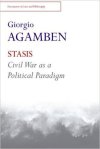Giorgio Agamben’s short book Stasis: Civil War as a Political Paradigm comprises two brief essays, one on the Athenian concept of “stasis” or civil war, the other on the role of the multitude in Hobbes’s Leviathan. What links them, he tells us, is the notion that “the constitutive element of the modern State” is “ademia [. . .] that is, [. . .] the absence of a people” (vi). Obviously enough, this will come as something of a surprise to “the Western political tradition” for which, as Agamben notes, the “concept of people” is “arguably the fundamental concept” (39). Think after all of the opening of the United States constitution, for which “we the people” are presented as that country’s basic political bedrock.
Agamben proposes instead the multitude as the core concept of political theory. So far, so good, and no doubt also so Italian. But what Agamben adds to the work of (say) Toni Negri and Paolo Virno is the observation that “the multitude is the subject of civil war” (40) and, further, that it is thus through civil war that the political realm is established. Or, as he puts it in his discussion of the Greeks:
it constitutes a zone of indifference between the unpolitical space of the family [oikos] and the political space of the city [polis]. [. . .] In the system of Greek politics civil war functions as a threshold of politicization and depoliticization, through which the house is exceeded in the city and the city is depoliticized in the family. (12)
For, as Agamben points out, Solon’s law explicitly punishes those who do not take part in civil war: such people forfeit their rights to citizenship; “not taking part in the civil war amounts to being expelled from the polis and confined in the oikos” (13). Civil war is, therefore, not (as we tend to see it) simply the point at which the political dissolves, as the state fractures and society is reduced to warring factions. It is also constituent, “the unforgettable that must always remain possible in the city,” however much today, by contrast, we regard it as “something that one must seek to make impossible at every cost” (16).
To put this another way (in terms that Agamben himself does not use), it is civil war that is the threshold or hinge between infrapolitics and politics per se. He offers here a theory of the ways in which the political emerges and is dissolved. Moreover, in his study of Hobbes, Agamben further offers civil war as the process by which what he calls the “dissolved multitude” (the multitude subject to biopolitical power) is transformed into the “disunited multitude” that makes itself known by turning on the absent people (absorbed into the figure of sovereign power, the Leviathan). And though it is not entirely obvious how these two conceptions mesh with each other, in both cases civil war has to remain an intimate possibility in the heart of any and every political order. For sovereignty, at least until the coming of the end times, can only remain an (optical) illusion, a trick of representation. In the meantime, “no real unity, no political body is actually possible: the body political can only dissolve itself into a multitude” (49). Agamben thus reverses the eschatological tendencies inherent (as I have argued elsewhere) in Negri’s vision of the multitude: here it is only the state that dreams of a substantial presence and unity to come. The multitude, by contrast, is located on a perennial threshold, figured as civil war, between house and city, infrapolitics and the political.
The sting in the tail of Agamben’s analysis, however, is given only sotto voce, in a digression or coda to the first essay that’s presented in smaller font than the rest. This is the observation that “the form that civil war has acquired today in world history is terrorism. [. . .] Global terrorism is the form that civil war acquires when life as such becomes the stake of politics” (18). This only goes to show once again that (whatever Negri thinks) nobody should look to the multitude for their salvation. But instead of denying the possibility of civil war, trying to exclude it from the political order, we need to recognize that order’s indebtedness to it, and pick one of the many sides (who says there should be just two?) that any such conflict opens up. For this is the very paradigm of the political, of the perpetual emergence and dissolution of political activity as such.
Crossposted to Infrapolitical Deconstruction Collective.

